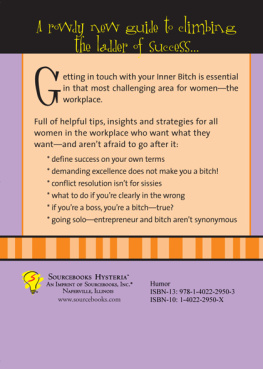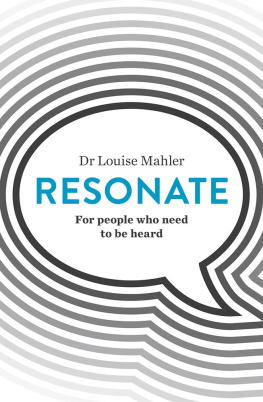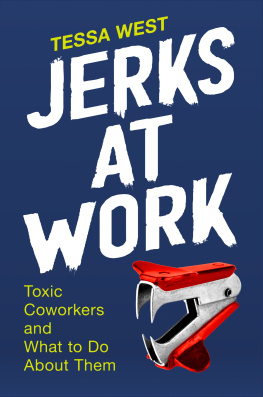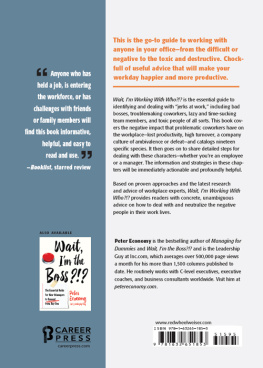Contents
Guide
Pagebreaks of the print version
WORKJERKS
How toCope with DifficultBosses and Colleagues
Louise Carnachan

Copyright 2022, Louise Carnachan
All rights reserved. No part of this publication may be reproduced, distributed, or transmitted in any form or by any means, including photocopying, recording, digital scanning, or other electronic or mechanical methods, without the prior written permission of the publisher, except in the case of brief quotations embodied in critical reviews and certain other noncommercial uses permitted by copyright law. For permission requests, please address She Writes Press.
Published 2022
Printed in the United States of America
Print ISBN: 978-1-64742-369-8
E-ISBN: 978-1-64742-370-4
Library of Congress Control Number: 2021924755
For information, address:
She Writes Press
1569 Solano Ave #546
Berkeley, CA 94707
Interior design by Tabitha Lahr
She Writes Press is a division of SparkPoint Studio, LLC.
All company and/or product names may be trade names, logos, trademarks, and/or registered trademarks and are the property of their respective owners.
Names and identifying characteristics have been changed to protect the privacy of certain individuals.
To the wonderful people I have met in my career and from whom I have learned so much. Thank you!
CONTENTS
PREFACE
Jean-Paul Sartre said, Hell is other people. You may agree. Being in any community requires tolerance, patience, and the willingness to give people a passeven if its more often than youd like. The definition of a jerk is in the eye of the beholder. People do things that push our individual buttons but dont bother others. Yet some behaviors annoy almost everyone. Weve all worked with jerks, and weve all been jerks. Im guessing you selected this book because you have a colleague whos really on your nerves. Your nemesis could be your special problem or may have a reputation for being a pill with everyone. And if a copy of this book was anonymously left on your desk? Well, then
If you find yourself fuming, getting sick, complaining incessantly to friends and family (who are tired of hearing about it), lying awake at night, and/or dreading going to work, its time for a change. Theres help in these pages!
Its impossible to foresee how the world of work will morph over time, but what will endure is the quirkiness of people. Irritating coworkers will find a way to reveal their stripes whether in person, via email, text, Zoom, Slack or the next virtual platform in the wings. This book is designed to provide you with practical ideas that can be adapted to any medium. It provides options of what to do, above and beyond what youve already tried. You may be pleasantly surprised that little tweaks can make a big difference.
Doing something to improve your situation is powerful; you stop being a victim, might get a better nights sleep, have happier days at work, and, just maybe, develop an improved relationship with your work jerk. And if you discover youve been the problem? Theres help for that too. Ready to do something to make things better? Good, lets get started!
Chapter One:HOW TO USE THIS BOOK
Up front you need to know theres no way youre going to make your problem coworker change. Thats an inside job for that person. What you have control over is what you think (which feeds how you feel) and what you do. Thats where well focus: how to change the situation by changing what you think, say, and do.
I expect you to use judgment as you evaluate these ideas. Dont do things youre pretty sure will get you fired (unless thats your goal!). But dont discard suggestions out of hand either. Consider this a shoe-shopping expedition: try things on, walk around a bit, then make up your mind about what you want to keep or discard.
I know firsthand what its like to be furious, hurt, baffled, or dumbfounded by someones workplace behavior. Earlier in my career, I was certain it was personal. Over the years Ive learned thats rarely the case. People act the way they do because it works for them, they dont know how to do anything differently, or its the best they can do with the resources they have. You may have noticed that other people can be with your problem person and witness the very same things you see yet dont come away from the interaction feeling the way you do.
We all have filters to make meaning of our environment. Our first set of filters came from the circumstances in which we were born (i.e., race, gender, class, region, etc.). Other important filters came from our families or caretakers. These were installed very early in life and may need a good spring-cleaning, if not replacement. Part of the work of dealing with difficult people is to realize whats going on with you (whats pushing your buttons) and then decide if thats how you want to live. Only you can change your mind and act in ways that help yourself.
Who am I? Im a white, boomer, cisgender, heterosexual woman. Ive worked with, taught, and coached many people who dont share my background. For over forty years Ive been in the trenches of companies as a coach, trainer, and, most importantly, as an employee. I graduated as a clinical social worker specializing in cognitive behavioral therapy and how systems affect individuals. Early on I veered away from being a therapist to teaching and advising others on teamwork, leadership, and communication. Ive worked as an employee and as a consultant in a number of industries. Ive coached and taught thousands of people suffering from workplace relationship issues. Ive counseled both the aggrieved and those who cause the grief, managers, and team members. Ive also had my own share of jerk challenges, so I know how draining it can be. What I offer draws from behavioral methods, conflict management principles, emotional intelligence theories and practice, and The School of Hard Knocks (i.e., what works in real life and in real jobs).
After decades of observing and interacting with folks at work, Ive accumulated a compendium of behavior patterns Im calling jerk archetypes, or Jerketypes. Each Jerketype has subtypes, or variations on a theme. In the following chapters, well cover:
- The Narcissist (Its all about ME!)
- The Know-It-All (I have an answereven when theres no question)
- The Incompetent (What, huh?)
- The Runaway Train (A variety of extreme behaviors)
- The Fight-or-Flee (Dukes upor run)
- The Poor Me (Versions of victimhood and helplessness)
- The Not-So-Funny Jokester (Ha-ha?)
- The We Are Family (Relationships at work)
- The Habitually Annoying Jerk (A potpourri of highly irritating behaviors), and finally,
- When the Jerk is a Toxic Work Culture (The problem is larger than any one individual).
The terms used in this book are informal, although some of the words have everyday, legal, or psychiatric meanings (such as bullying, narcissists). I dont provide legal advice or psychiatric diagnoses. The colleagues and clients Ive coached over the years have asked for practical ideas about what to do and havent been very interested in how the person became a jerk to begin with. Ive intentionally stayed light on the whys and heavy on how-tos.









